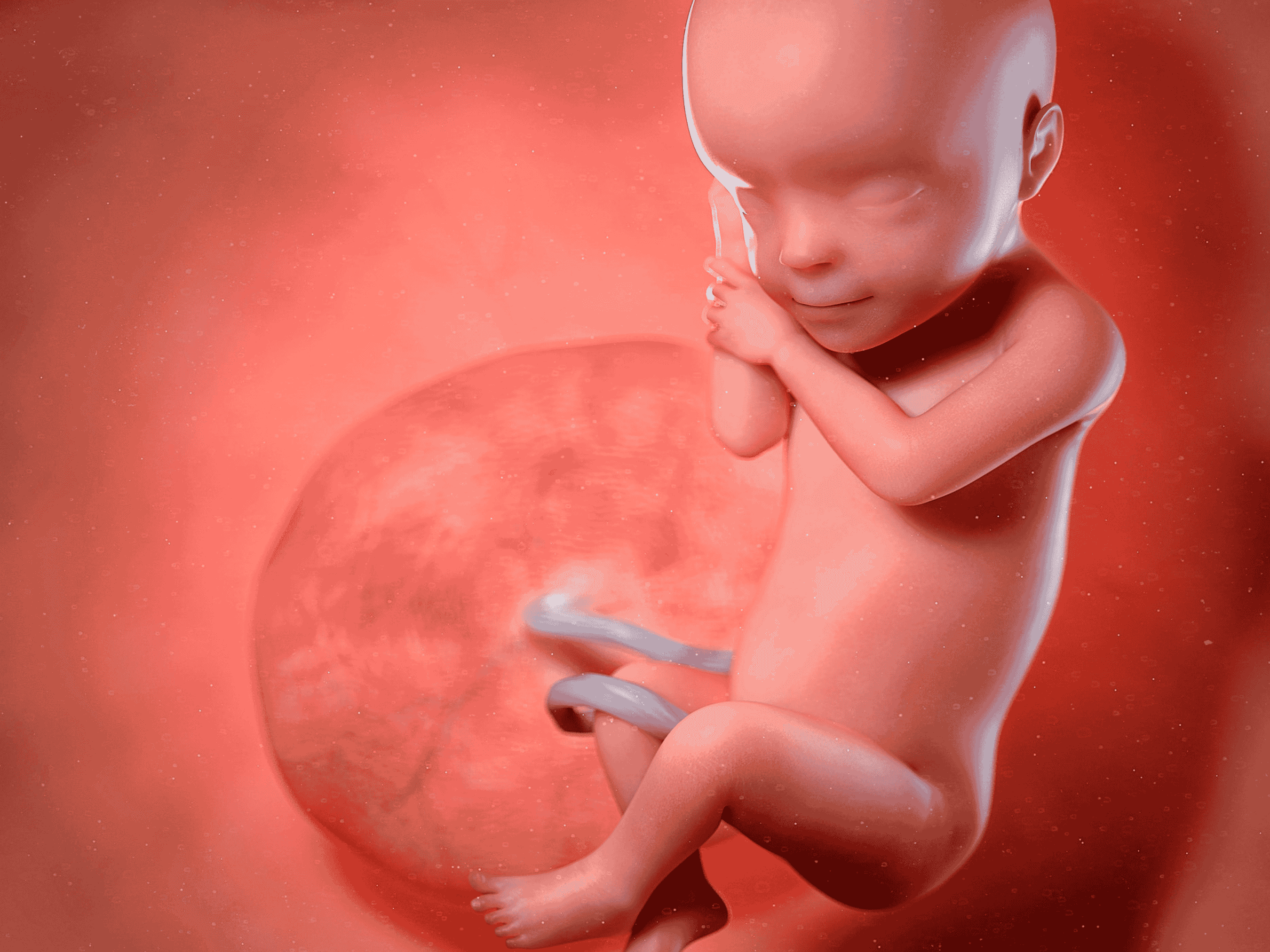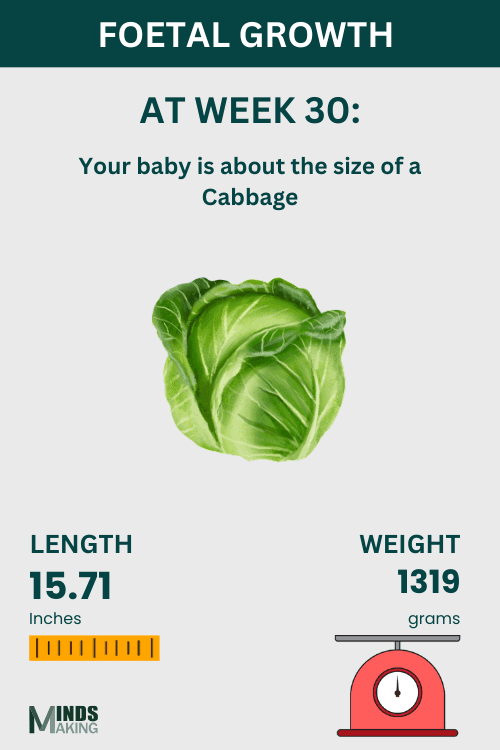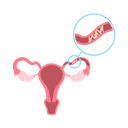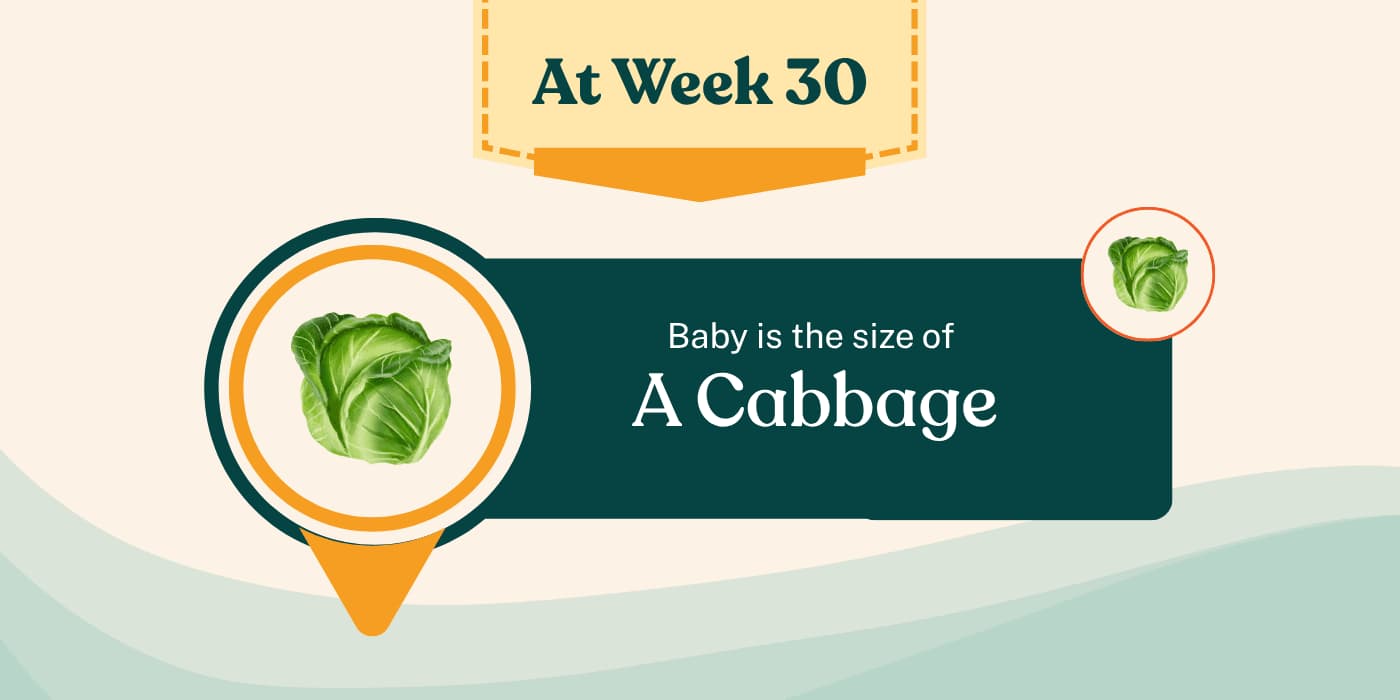Your Pregnancy at Week 30
science photo library

Written by Mindsmaking Medical Writer
Fact Checked by Mindsmaking Professionals
2nd, December, 2025
At 30 weeks pregnant, you are about three-quarters of the way through your pregnancy, with roughly 9 to 10 weeks remaining until full term.
At 30 weeks pregnant, you're roughly three-quarters of the way through your pregnancy, with the full term being between 39 and 40 weeks and 6 days. This milestone can be exciting and overwhelming, as there's still much to prepare for before your baby arrives. As you approach this stage, your baby and body continue to change. Understanding what to expect can help you feel more in control and prepared.
Key Takeaways
Your baby's brain can now regulate body temperature, leading to the shedding of lanugo, the fine hair that has been insulating them.
Your baby measures around 15.71 inches and weighs about 1319 grams, comparable to a cabbage.
Hormonal changes are also causing your joints to loosen, which can lead to your feet growing in size.
Your baby's rapid growth will likely cause your bump to expand, making your uterus feel heavier and pushing your stomach and diaphragm upwards.
Vivid and unusual dreams are normal and often linked to hormonal changes and anxieties about motherhood. Sharing these dreams with your partner can provide relief and connection.
As you near the end of your pregnancy, keep track of any contractions. If they become frequent and intense, they may be real contractions, not Braxton-Hicks.
A prenatal massage can help relieve common pregnancy discomforts, reduce swelling, and improve mood. Ensure the therapist is licensed in prenatal techniques and consult your doctor before booking.
Conducting thorough research on essential baby products like car seats and cribs can help you and your partner make informed decisions.
Packing your hospital bag now can save stress and last-minute panic when labour starts.
Take a peek

Wrinkled brain surface
The surface of your baby's brain starts to wrinkle; these wrinkles are known as convolutions, which occur in order to accommodate more brain cells.

Thumb sucking
Your baby is getting ready for their big debut by practising thumb-sucking, a cute and natural way to prepare for breastfeeding once they arrive.

Kicks
Your baby's space is getting tighter as he grows, and you'll continue to feel movement each day. Don't forget that those kicks count!
Baby Development at Week 30
At 30 weeks pregnant, your baby grows rapidly, taking up more uterine space. Your body adjusts by allowing the uterus to expand upwards under your rib cage. By this stage, your baby's eyes are maturing, enabling them to differentiate between light and dark and even follow a light source. After birth, it's normal for babies to keep their eyes closed most of the time and focus only on objects very close to their faces. While adults typically have 20/20 vision, newborns have much poorer vision, around 20/400. (3)
Your baby is developing white fat cells under the skin, which can lead to bursts of energy and potentially unusual positions, like lying sideways (transverse lie). This is normal, as the baby is floating in amniotic fluid and will move into the ideal head-down position closer to birth. Expect strong kicks and pressure from the baby's movements, which might not align with your sleep patterns. Although your baby's eyesight is still developing, it can recognise objects close to its face, and all five senses are active.
Your baby's brain is growing and maturing, forming grooves and folds on its surface. These wrinkles allow brain tissue to expand as your baby grows and learns. Additionally, your baby's brain can now regulate his body temperature, which means he starts to shed the lanugo, the fine hair that has been insulating him. (1)
From 30 to 35 weeks, your baby's lungs develop quickly, meaning that each day brings them closer to breathing independently without much assistance. During this time, your baby also starts sucking their thumb, a natural practice that prepares them for breastfeeding after birth. (9)
Mindsmaking

Body Changes at Week 30
At 30 weeks pregnant, you might get more tired than usual, especially if sleep is elusive at night. Experimenting with different sleeping positions might help you rest better. If insomnia becomes a persistent issue, it's wise to talk to your healthcare provider. You may also notice mood swings, a common experience in the third trimester, which could have also appeared earlier in your pregnancy. Hormonal changes are also causing your joints to loosen, which can lead to your feet growing in size, some women even find their feet increase by a whole shoe size, which can be permanent. (3)
You might experience vivid and sometimes unsettling dreams, particularly about childbirth. Rest assured, these dreams are just your mind's way of processing your thoughts and worries, not predictions of what will happen. Hormonal changes also contribute to the intensity of these dreams. Sharing them with someone you trust can help ease your concerns and may even provide some humour. You might also notice itching, especially on your growing belly, due to your skin stretching. If the itching becomes severe or affects your hands and feet, especially at night, inform your midwife immediately, as it could be a sign of obstetric cholestasis. This serious liver condition can develop after 28 weeks of pregnancy. (7)
Read This Next
No posts available
Baby Bump At Week 30
Around 30 weeks pregnant, you'll likely see significant growth in your bump as your baby grows quickly and gains weight. This rapid expansion can make your uterus feel heavier and push your stomach and diaphragm upwards towards your lungs. During this time, if your fundal height is measured, it will typically be around 30 centimetres (11 to 12.5 inches) from your pubic bone to the top of your uterus.
You might also notice your belly feeling hard and tight at times due to Braxton Hick's contractions. These are ‘practice contractions’ that your body uses to prepare for labour. They often occur after exercise, sex, or when you're tired or dehydrated. Try sitting or lying on your side, relaxing, and drinking water to relieve them. If the contractions persist or you experience four or more in an hour, contact your doctor, as this could be a sign of preterm labour.
Pregnancy Symptoms at Week 30

Feet changes
You're not mistaken if your feet change size during pregnancy. Many women experience an increase in shoe size during pregnancy. Studies indicate that pregnancy can impact both foot size and structure. Although swelling from fluid retention usually decreases after delivery, pregnancy can permanently change your foot arch. If soft, supportive slippers aren't suitable for daily wear, it might be a good time to invest in a new pair of shoes that provide comfort and a proper fit for the rest of your pregnancy.

Back pain
Back pain is common during pregnancy, especially as you gain weight in the third trimester. As you approach the final weeks, there are several strategies to help alleviate this discomfort. Start by consulting your doctor to ensure your weight gain is on track; excessive and insufficient weight gain can impact your back pain. Good posture is crucial; if you struggle to maintain it, consider using a pregnancy support belt. If you work at a desk, ensure your workspace is ergonomically set up to reduce strain. Elevating your feet can relieve back pressure, and switching to supportive flat shoes can also help, save the high heels for after your baby arrives. If your back pain persists, discuss remedies with your doctor or ask your partner for a soothing massage, strengthening your bond.

Mood swings
If you found some emotional relief during your second trimester, it's normal to see mood swings return in the third trimester. The stress of impending motherhood and increased fatigue can affect your mood. If anxiety about pregnancy or becoming a parent is disrupting your sleep, daily life, or relationships, it's important to speak with your doctor. Depression can occur during or after pregnancy, and your doctor can provide the support and resources you need to manage it.

Weird dreams
Another common sleep symptom is having unusual dreams, but there's no need to panic, they're perfectly normal. While the exact cause isn't fully understood, hormonal changes might contribute to these vivid dreams. They often serve as a way to process your thoughts and worries about your baby's upcoming arrival and motherhood. Sharing these dreams with your partner can be helpful, as they might also be experiencing similar dreams. Interestingly, your baby is also experiencing rapid eye movement (REM) sleep, which means they might be dreaming too.

Discharge and itchiness
Increased vaginal discharge is a common and normal part of pregnancy, though it can be uncomfortable. Suppose you notice that the discharge becomes excessive or changes in consistency; it could be a sign of thrush, a common yeast infection during pregnancy. Thrush can also cause itching. Fortunately, it's easily treatable with over-the-counter treatments like creams or pessaries. Just be sure to inform your pharmacist that you're pregnant before getting any medication.

Swelling
Swelling in your ankles and feet is common as you approach the end of pregnancy, partly due to the pressure from your growing uterus on your pelvic veins and the inferior vena cava, which affects blood flow and causes fluid to pool in your lower limbs. Hormonal changes and fluid retention also contribute to this swelling, with many women carrying an extra 2 to 3 pounds of water weight by the end of their pregnancy. While some swelling is normal, excessive or sudden swelling, especially if it affects your hands and face or is uneven between your legs, could indicate a more serious condition like preeclampsia or deep vein thrombosis (DVT). If you experience these symptoms, contact your healthcare provider for guidance.
Pregnancy Concerns at Week 30
Keep an eye out for uterine contractions as you approach the final weeks. Although you still have about 10 weeks left, labour can begin early. If you start experiencing more frequent and intense contractions, they may be genuine ones rather than Braxton-Hicks. When in doubt, it's best to contact your doctor. Additionally, if you experience vaginal bleeding or fluid leakage, reach out to your healthcare provider immediately.
Also, if you're struggling with severe sadness or anxiety, consult your doctor. They can assist in safely managing and treating depression or anxiety.
Health Tips for Week 30
Manage water retention
Drinking plenty of water is essential during pregnancy, especially to manage swelling. Adequate hydration helps flush out excess sodium and waste products from your body, which can help keep swelling in check. Pregnancy naturally increases body fluids, which can lead to swelling, especially in the ankles. While some swelling is normal, drinking water and reducing salt intake can prevent excess fluid from accumulating in unwanted areas. Support stockings, which improve circulation, can also help reduce swelling. Additionally, soaking in Epsom salt baths can relax your muscles and alleviate swelling, while swimming provides a gentle way to exercise and reduce fluid retention.
Wear comfortable shoes
In the final trimester of pregnancy, comfort becomes your top priority, especially regarding footwear. Wearing tight or restrictive shoes will only add to your discomfort with your feet likely swollen and sore. Instead, look for shoes that offer flexibility and space to accommodate swelling. Opting for soft, supportive, and adjustable styles will help ease foot pain and make daily activities more bearable. Remember, it's not about high fashion at this stage, it's all about keeping your feet happy and comfortable as you approach the big day.
Get omega 3
Omega-3 fatty acids are well-known for their health benefits, including reducing the risk of cardiovascular disease, certain cancers, Alzheimer's disease, and dementia. For pregnant and breastfeeding women, these nutrients are particularly valuable for supporting your and your baby's brain development. You can find omega-3s in fish, flaxseeds, broccoli, kidney beans, spinach, and walnuts. It's recommended to consume two to three servings of fish each week. However, be cautious about mercury levels in fish, as high levels can be harmful. Check fish labels and consult your healthcare provider if you're unsure about mercury content.
Get a prenatal massage
Prenatal massage offers several benefits for expectant mothers, especially as you approach the final stages of pregnancy. It's a great way to unwind and ease the common discomforts associated with late pregnancy, such as back pain, leg cramps, and muscle tension. This massage can also help reduce swelling, improve circulation, and elevate your mood, making you feel more relaxed and rejuvenated. When choosing a prenatal massage therapist, it's important to select someone licensed and specifically trained in prenatal techniques to ensure your safety and comfort. If you're unsure where to find a qualified therapist, consider asking for recommendations from friends, family, or local parenting groups. Before scheduling your session, consult your doctor or midwife to confirm that a prenatal massage is safe.
Buy a pregnancy pillow
If you're struggling with sleep during pregnancy, a pregnancy pillow could be a helpful solution. These specially designed pillows provide support and help you find a more comfortable sleeping position. While they might not solve every issue contributing to pregnancy-related insomnia, they can make it easier to fall asleep and stay asleep by alleviating discomfort and providing better support for your body.
Advice for Partners
By 30 weeks, both you and your partner should be able to feel the baby's movements. Spend quiet moments with your hand on your partner's belly to experience these movements together. This shared experience helps you bond with your baby and creates a special connection between you and your partner.
Your partner is in the third trimester, and it's time to finalise your preparations for the baby. With so many baby products available, thorough research is essential. Look at our recommendations if you're still deciding on items like car seats and cribs. Our lists of top baby gear and detailed reviews can help you make informed choices and simplify your shopping process.
Pregnancy Checklist for Week 30
- Getting prepared early for your baby's arrival might seem premature, but it's a smart move. Packaging your hospital bag can save you stress and last-minute scrambling when labour begins.
- Now's a good time to learn about the mucus plug which seals the cervical opening to safeguard your baby from bacteria. As you near labour, this plug will be expelled, so it's helpful to be aware of it.
- Ensure that you and everyone involved have reliable phones and each other's contact information. Distribute the details of your healthcare professionals and the hospital or healthcare facility's contact information and directions to your immediate family and support team.
- As you approach childbirth, your friends and family might offer to help you. Start listing chores or tasks you'd like assistance with. This way, you'll clearly know what specific jobs you can assign.
- This week is a great time to schedule a shoot! Your baby bump is nicely defined at this stage, and you'll capture some beautiful memories.
Frequently Asked Questions
How big is my baby at pregnancy week 30?
It's week 30, and your baby is getting bigger every day. Your baby is the size of a large cabbage, weighing about 15.71 inches from crown to heel. They are very active and are kicking more than before.
How much calcium should I be taking at 30 weeks pregnant?
It's crucial to get enough calcium daily, whether pregnant or not, with a recommended intake of 1,000 mg daily. This need becomes even more pressing during the third trimester as your baby's bones strengthen. If you don't consume enough calcium, your body will take it from your bone stores, which can weaken your bones over time. To meet your calcium needs, aim for three servings of calcium-rich foods daily, such as cheese, milk, yoghurt, fortified cereals or soy milk, leafy greens like spinach, and fish with bones like canned salmon or sardines.
How can I deal with belly button discomfort in week 30 of pregnancy ?
If your belly button feels unusually sensitive and sore, it's likely due to the stretching of your skin as your belly grows, which can cause friction against your clothing. To ease the discomfort, you can cover your belly button with a bandage or opt for loose-fitting clothes that don't rub against the area. However, if you notice a hard lump around your belly button, it could be an umbilical hernia, where part of your intestine pushes through the abdominal wall. In this case, informing your doctor is important, as they can provide guidance and treatment options.
How do I deal with itchy skin at 30 weeks pregnant?
Itchy skin is a common issue during pregnancy, often caused by hormonal changes and the stretching of the skin as your belly grows. To soothe mild itching, use gentle products like lotion, coconut oil, or a soft moisturiser. If you have a pre-existing skin condition like eczema, you should consult your healthcare provider for tailored advice. However, intense, persistent itching could be a sign of cholestasis, a liver condition that can develop in late pregnancy and may need medical treatment. Always check with your provider if you have concerns about severe itching.
Was this article helpful?
How many stars are you giving this article?
Leave a comment
Your email address will not be published.










































